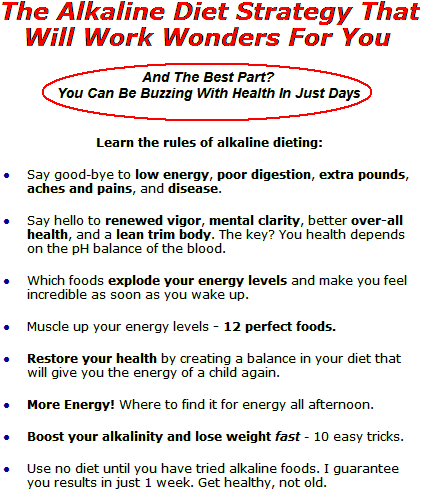Migraine Prevention - Part 3 - Get Alkaline-Balanced
Migraine headache is one of the symptoms of your body being too acid. Headache prevention is one of the benefits of alkalizing yourself - through the food you eat and how you emotionally respond to everyday life.
What Does Being Acid Mean?
Your body contains about ten gallons of fluid, so your cells are swimming in a 'sea' that can be alkaline, neutral, or acid. However, the systems in your body (enzyme, immune, and repair mechanisms) work best when their environment is very slightly alkaline. Note: on the pH scale of 0 to 14, 7 is neutral; below 7 is acid; above 7 is alkaline.
Where Does the Acid Come From?
Acid comes from cell metabolism and from food metabolism. Cell metabolism (cells convert into energy the small food units produced by your digestion system) produces a weak acid, which can be eliminated by breathing. Food metabolism results in a residue (often called an 'ash') which can be alkaline or acid, depending on the minerals in the residue. (When the residue is predominantly calcium, magnesium, potassium and sodium, the food is considered alkaline-forming. Acid-forming foods leave residues that are predominantly sulfur, phosphorous, and chlorine.) The acid from food metabolism is strong and needs to be buffered (combined with something alkaline) before it is eliminated.
Your Body Needs to Be Alkaline on Balance
While leaning too much to either the alkaline or acid side isn't good, the problem with most people in our culture today is being overly acid. Most of the food eaten is acid-forming -- pizza, burgers, french fries, soft drinks, fried chicken, donuts, potato chips, pretzels, candy, etc.
Where Do the Buffering Alkaline Minerals Come From?
If you are healthy, you have an alkaline reserve in your tissues. If you don't have these reserves, your body will take alkaline minerals from your bones or muscles. Your body literally eats itself up from the inside.
(In fact, osteoporosis is more a problem of overacidity than a lack of calcium. When your body is too acidic and can't buffer the acid any other way, it leaches alkaline minerals -- like calcium -- from your bones.)
How Bad Can It Get?
If your body can't excrete all the acid it needs to get rid of, it will store the acid in your tissues. Acid will get stored everywhere from the heart to the brain. (Sometimes your body will produce fat in which to store the acid. This is why, as you become acid-alkaline balanced, you often lose weight.)
High acid levels in tissues lead to irritation and inflammation, which your body translates into pain.
How Do You Know if You Are Overly Acid?
Use pH paper -- available inexpensively from many online supplement stores -- to test your saliva (or urine.) Steady alkaline saliva pH readings indicate overall well-being and good health.
How Do You Become More Alkaline?
Eat more alkaline-forming foods; eat fewer acid-forming foods. For example, apples, oranges, cucumbers, and lettuce are alkaline-forming. Cakes, bread, chicken, and beef are acid-forming. You can test your saliva with pH paper to measure your progress, but you will also know you are improving because you feel better. Note: Acid-forming foods are not necessarily 'bad.' Many contain nutrients that you must have. The point is to strike the right balance -- usually about 70% to 80% alkaline-forming foods and to 30% to 20% acid-forming foods -- so that your body stays very slightly alkaline.
Your Emotions Are a Big Contributor to Your Body's pH
Toxins are not just found in foods. Emotions can be toxic -- including anger, fear, and jealousy. Stress is the greatest acidifying factor. You can eat the best alkaline diet and wipe out its good effects with a very stressful episode.
Finding ways to keep your emotions on a fairly even keel will not only feel good, but will help to provide your body with an alkaline 'cushion' for the stresses and variations in diet encountered in daily life.
Sandra Feder is a writer (fiction and nonfiction) and a former research chemist. I'm interested in migraine symptoms, migraine treatment, migraine help, migraine prevention, migraine relief, because I had migraines for many years. I developed a system that helped my body to stop making migraines and I wrote a book about it. I found that there were five areas of imbalance that contributed to my migraines. Stop Migraine Symptoms Naturally
Sign up for the free e-course: 6 Things They Won’t Tell You About Migraines
Labels: acid_alkaline_eat_food_smoking_stop, alkaline_diet_loss_weight, the_acid_alkaline_diet_for_optimum_health_restore_your_health_by_creating_balance_in_your_diet

